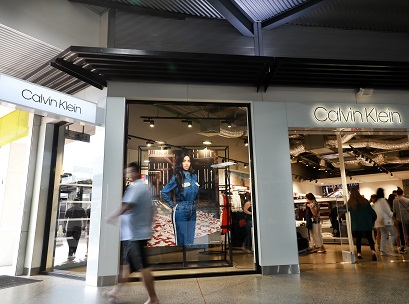PVH profit hit by tariffs, falling sales US clothing company PVH, the owner of leading brands such Calvin Klein, Van Heusen, Tommy Hilfiger, Izod and Arrow among others, has cut its full-year profit forecast for the second time this year due to the US-China trade tensions and the ongoing protests in Hong Kong. The company now expects full-year adjusted profit of between US$9.30 and US$9.40 per share compared to prior estimate of US$10.20 to US$10.30 per share. PVH said the US tariffs on Chinese
inese goods would hit its earnings by about US20¢ a share in 2019.
The company also expects full-year revenue to grow about 1 per cent, down from its prior outlook of about 3 per cent. PVH imported about US$400 million ($595 million) of inventory from China last year.
The company is also facing the increasing promotions by retailers and department store operators in the domestic US market as they grapple with a slow sales due to a fall in tourist spending and recession fears.
Tiffany keeps its eyes on China
New York-based luxury jeweller Tiffany has reported quarterly earnings that beat estimates on a drop in marketing costs, even as sales were hurt by lower spending by Chinese tourists in the US and political unrest in Hong Kong.
Tiffany’s net income for the quarter dropped to US$136.3 million ($202.7 million), or US$1.12 a share, compared with US$144.7 million, or US$1.17 per share, a year earlier. That was better than expectations of US$1.04, based on Refinitiv data.
The company, however, concentrated its efforts on mainland China, where sales continued to be strong.
“There is little we can do on tourist slows around the world so our way to react to this is to continue to be more active locally, domestically in China, where customers are,” chief executive Alessandro Bogliolo told Reuters.
The company is renovating and expanding its flagship store in Shanghai, and a flagship store in Hong Kong is set to open in September. The company will feature Tiffany Blue Box Cafes in both locations.
Crowds swamp Costco opening
US wholesale retailer Costco has announced that it will limit the number of shoppers at its new store in China after overcrowding – complete with frenzied scenes of aggressive shoving and long snaking queues at checkouts – forced the US big box retailer to shut it early on its opening day.
No more than 2000 shoppers at any given time will be allowed into the store in a Shanghai suburb, Costco’s first in China, and local police will help to improve the flow of traffic near the store.
Scenes of mayhem are not uncommon when new stores open in China. Consumers lined up for hours to buy hamburgers at Shake Shack when it opened its first China store in Shanghai earlier this year, and scalpers reportedly held places in line or hawked burgers at huge markups, according to Reuters.
German supermarket chain Aldi also experienced long queues of shoppers when it opened two stores in Shanghai in June, which were also its first in China.
Disney, Target form ‘brilliant’ partnership
Disney and Target have announced a collaboration that will open 25 Disney stores inside select Target locations across the US in October, with plans for 40 additional sites by October next year.
Disney said in a statement that the “shop-in-shop” would feature an array of more than 450 items from the company, including more than 100 products previously only available at its own locations.
The Disney shops will have an average of 750sqf, according to CNBC, and will be located inside Target stores adjacent to children’s clothing and toys.
Inc website called the partnership idea “brilliant” and “a win for both brands” that would “shape the world of retail for years to come” as it marries Disney’s popular products with Target’s retail expertise. Disney on its own had a rocky experience with retail in the 1990s, when it was forced to close some 400 shops.
Forever 21 to file for bankruptcy
US fast-fashion retailer Forever 21 is apparently preparing for a potential bankruptcy filing, according to widespread media reports.
The company has been in talks for additional financing and is working with a team of advisers to help restructure its debt, but negotiations with possible lenders have, reportedly, so far stalled.
Forever 21 is based in Los Angeles and has more than 700 stores worldwide. It opened a handful of shops in Australia in 2014, but wound up these operations in 2017, one of a number of international fashion brands to fail in the Australian market.
D&G feels effects of failed ads
Italian fashion house Dolce & Gabbana expects sales in China to fall in the current fiscal year after a slowdown in 2018-19, in a sign the brand is still struggling to shake off the fallout from a controversial advertising campaign in the country.
Last November the group was forced to cancel a marquee show in Shanghai amid a spiralling backlash against an advertising campaign that was decried as racist by celebrities and on social media and led to Chinese e-commerce sites boycotting D&G products.
Although D&G does not disclose its results publicly, Reuters reports that its Asia-Pacific market shrank to 22 per cent from 25 per cent of total turnover this year and the group expects sales in Greater China to decline in the current fiscal year, ending in March 2020.
Ikea China expands
Ikea China will invest RMB10 billion ($2 billion) into the market within the next fiscal year. The company plans to launch four new locations by the end of the year alongside its expanded coverage online, and will hire an additional 3000 staff as the online furniture industry picks up more competitors, including Alibaba-backed Red Star Macalline Group.
The Swedish furniture maker’s move is in response to changing demands in the local furniture market in an increasingly urbanised China.

